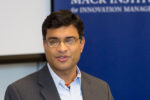
In the digital era, even companies that have distinguished themselves as disruptors cannot afford to rest on their laurels. If they do, they face the chance of being disrupted themselves.…Read More

In the digital era, even companies that have distinguished themselves as disruptors cannot afford to rest on their laurels. If they do, they face the chance of being disrupted themselves.…Read More

Wharton emeritus professor Sid Winter discusses how innovative activity affects industry evolution, as described in his new book “Innovation and the Evolution of Industries.”…Read More

Word-of-mouth testimonials from consumers are effective in driving online sales. But these signals are even more powerful in communities where people have closer ties and trust each other, according to new research by Wharton marketing professor David Bell and Jae Lee. …Read More

Professor Gilles Duranton discusses his research on urban mobility and vehicle innovation, and considers potential solutions for easing urban congestion.…Read More

A series of interviews discussing how adoption of Blockchain technology will impact financial services, telecommunications, real estate, and more.…Read More

Online rating systems obviously benefit consumers by providing transparency, but do these systems help or hurt the providers? Mack Institute researcher Chen Jin investigates.…Read More

Ajay Raju, Chairman & CEO of the venerable Philadelphia law firm Dilworth Paxson, discusses his vision for innovative transformation in the legal industry with Mack Institute Executive Director Saikat Chaudhuri.…Read More

Though one-stop shops seem like an obvious business strategy, research finds that client-supplier relationships play a stronger role in value creation.…Read More

A critical factor that determines whether a startup succeeds or fails is its level of spending, or burn rate. Research from professors Ron Berman and Pablo Hernandez-Lagos examines how an entrepreneur’s education and experience levels can predict a startup’s burn rate, and thus its odds of success.…Read More

When it comes to tackling large-scale socio-economic problems, especially in emerging markets, several entities usually form partnerships to solve these challenges. But what is the optimal configuration of these partnerships? And how should they best be coordinated for maximum effect?…Read More

The value of a patent traditionally depends on the number of citations it receives from subsequent innovations. But new research from Wharton management professor Tyler Wry and doctoral student Adam Castor calls into doubt whether citation numbers accurately reflect a patent’s true value.…Read More

Conventional wisdom says brainstorming works best when people from different departments or groups come together to think of new ideas or solve problems. But research from Senior Fellow Sarah Kaplan shows that diversity is not enough.…Read More

Recent research by Senior Fellow Gary Dushnitsky measures the innovation success of new biotech ventures by tracking their patenting and publishing rates. He and coauthor Elisa Alvarez-Garrido find that the identity of the investor makes a big difference.…Read More

Does intensive internal training of employees lead to higher profits? In knowledge-based industries where the main asset is skilled professionals such as software engineers, the answer is yes, according to Senior Fellow Joydeep Chatterjee. But not all training yields equal benefits.…Read More

Patent trolls are maligned for impeding innovation, but new research by Penn professor David Abrams suggests that they actually play a more complex and sometimes beneficial role.…Read More

Executive Director Saikat Chaudhuri spoke with Knowledge@Wharton about Nokia’s high-profile merger with French firm Alcatel-Lucent.…Read More